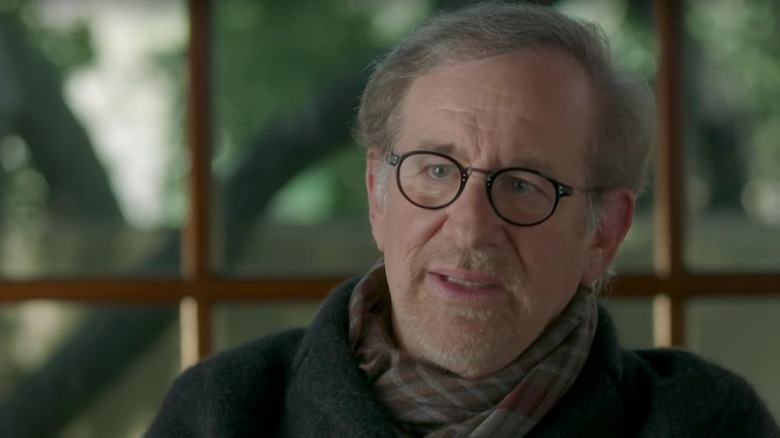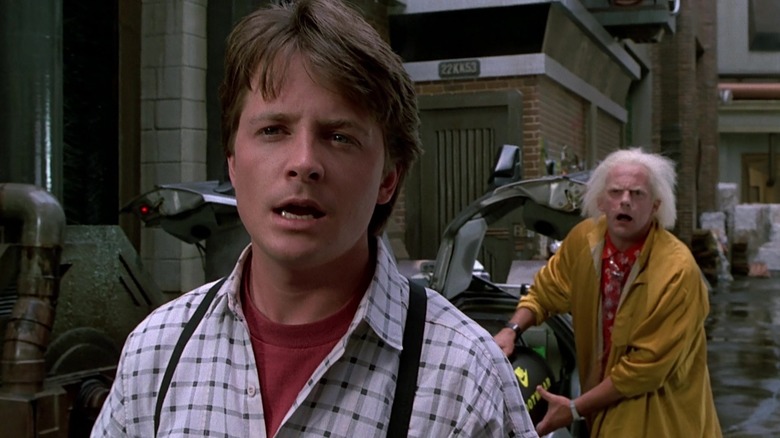Watch This Steven Spielberg-Produced Classic Before It Leaves Netflix Next Month
This post contains spoilers for the "Back to the Future" trilogy.
Director Robert Zemeckis struggled with creating a successful, financially viable project after helming two films at the onset of his career — 1978's "I Wanna Hold Your Hand" and 1980's "Used Cars" — which were produced by his mentor, Steven Spielberg. Despite being backed by such a bankable stalwart in the industry, Zemeckis' films experienced commercial failure time and again, making it difficult for him to land meaningful work during the early 1980s. However, his longtime collaborator, Bob Gale, teamed up with Zemeckis again to pen the script for a time-travel adventure focused on a teenager and an eccentric scientist, which was rejected by several studios at the time, prompting him to seek support from Spielberg's own production company, Amblin Entertainment. Although Spielberg's involvement was minimal compared to past collaborations, the director joined as an executive producer, allowing the project to take off. Thus, "Back to the Future" was born.
It is an understatement to say that the legacy carried by the "Back to the Future" franchise is phenomenal. These beloved films are forever etched into public consciousness, revisited time and again through the lens of nostalgia and the urge to recapture an elusive aspect of a simpler time. This sentiment is not too different from the kind of emotions some Spielbergian classics evoke, but Zemeckis' trilogy represents the wonders of endless possibilities ... as well as the dangers posed when one tinkers a bit too much with what is meant to be. A groundbreaking combination of pulp science-fiction and heartwarming comedy, the trilogy remains immensely rewatchable despite the genre being saturated with more promising entries today.
If you wish to reacquaint yourselves with the franchise, make sure to watch the "Back to the Future" trilogy on Netflix before it leaves the streaming platform on September 30, 2024.
What do the Back to the Future movies bring to the table?
1985's "Back to the Future" hones in on teenager Marty McFly (Michael J. Fox), whose friendship with unorthodox scientist Emmett "Doc" Brown (Christopher Lloyd) accidentally leads to a time travel mishap, sending him back to 1955. The mechanics of time travel are not terribly important here, as accuracy isn't the goal for establishing the DeLorean MacGuffin. It looks and sounds cool when Doc Brown explains how plutonium powers the flux capacitor to generate energy enough to warrant time travel — 1.21 gigawatts, to be exact — before he's seemingly murdered by a group of terrorists. The rest of the narrative underlines Marty's collision with a set course, which unravels his very existence, creating a temporal paradox that only the good Doc can unentangle.
Rarely has a film been able to perfectly nail the blockbuster formula, as "Back to the Future" cleverly sets up its events through recurring motifs of ticking clocks and blink-and-you-miss-it references that take on new meaning during a second viewing. The pocket worlds created within the first film also feel incredibly lived-in, with the town of Hill Valley emerging as incredibly familiar and comforting despite its fictional nature. Moreover, whenever Marty feels lost or rootless, it helps mirror the growing pains of adolescence: a sensation almost everyone can relate to, no matter the circumstances revolving around them in the present.
The impetus of the narrative does not lie in the scientific jargon behind the act of time travel itself, but in the emotional repercussions of the act, filtered through moments of nostalgic humor and heartrending pathos. Although the film does not dwell too heavily on the scientific aspects of temporal paradox, it does not need to, as the thrill of watching the DeLorean roar to life, coupled with the trials of Marty's adventure, contributes to the heart of the film. The sequels replicate this formula by jumping across time, to the past and the future, to create varying conundrums. Although the later installments aren't as unforgettable as the 1985 classic, they are still memorable enough to compound towards a satisfying conclusion.
The "Back to the Future" trilogy is currently streaming on Netflix.

